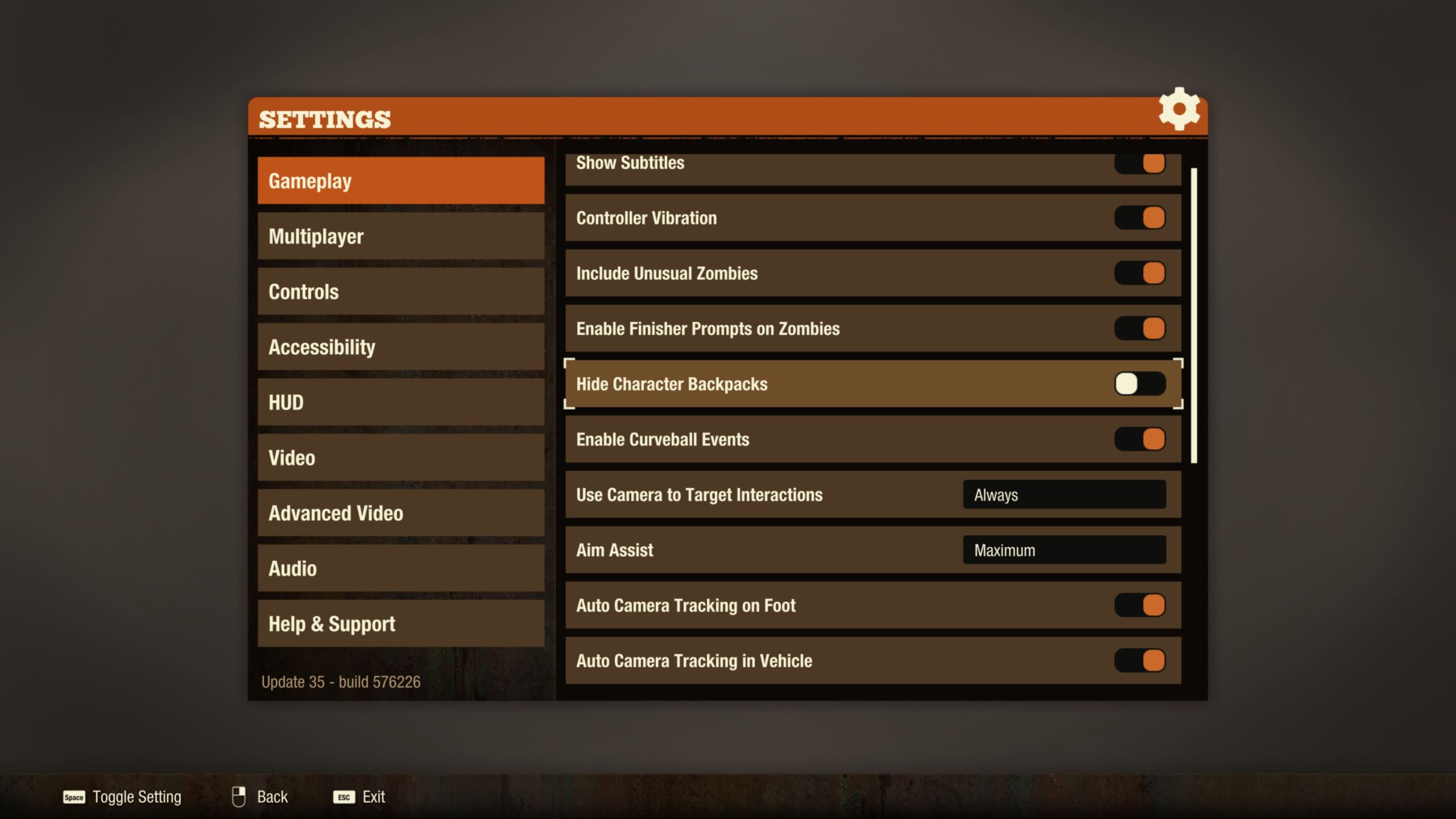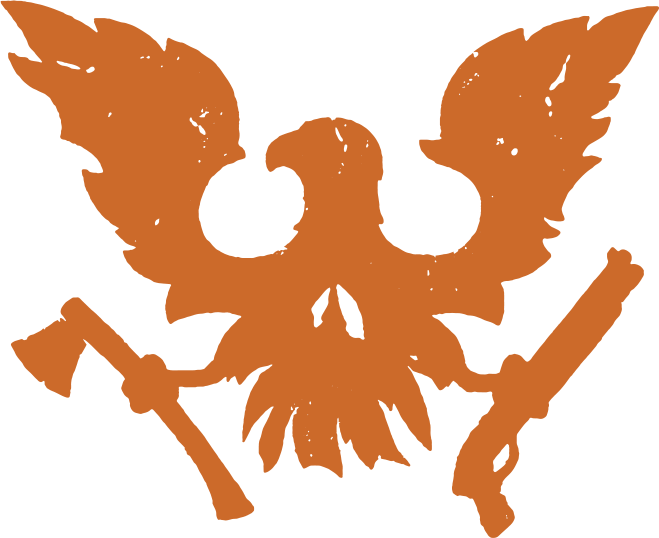Building Your Community
When playing State of Decay 2, you control a group of survivors. These survivors are collectively called your “community.” Each survivor in your community has a unique blend of skills, traits, and personality.
You begin the game playing one of these survivors, and you can switch between survivors using the Community screen. You might choose to do this if your active survivor becomes tired or injured, if another character wants to accomplish a personal goal, or even if you just want a change of pace. Note, you can only switch characters at your home base or an outpost.
Skills & Specialization
Every survivor has the same four basic skills (Cardio, Wits, Fighting, and Shooting). Some survivors also have an extra fifth skill, such as Cooking or Gardening. As you perform certain actions in the game, these skills improve. When you max out a basic skill (that is, when it reaches 7 stars), you unlock one or more specialization options for that skill. Each specialization offers new abilities or benefits for that survivor or for your community.
There are a few characters whose 5th skill is left blank. When that happens, the textbooks you find when looting can be used to level up your survivors with the matching skill. For example, if you find a book on cooking, find your community member with the 5th skill of cooking and have them use it to improve their cooking skills (raise their stars). Some upgraded outposts also have the option to “learn” new skills as well, another reason to choose your outposts wisely.

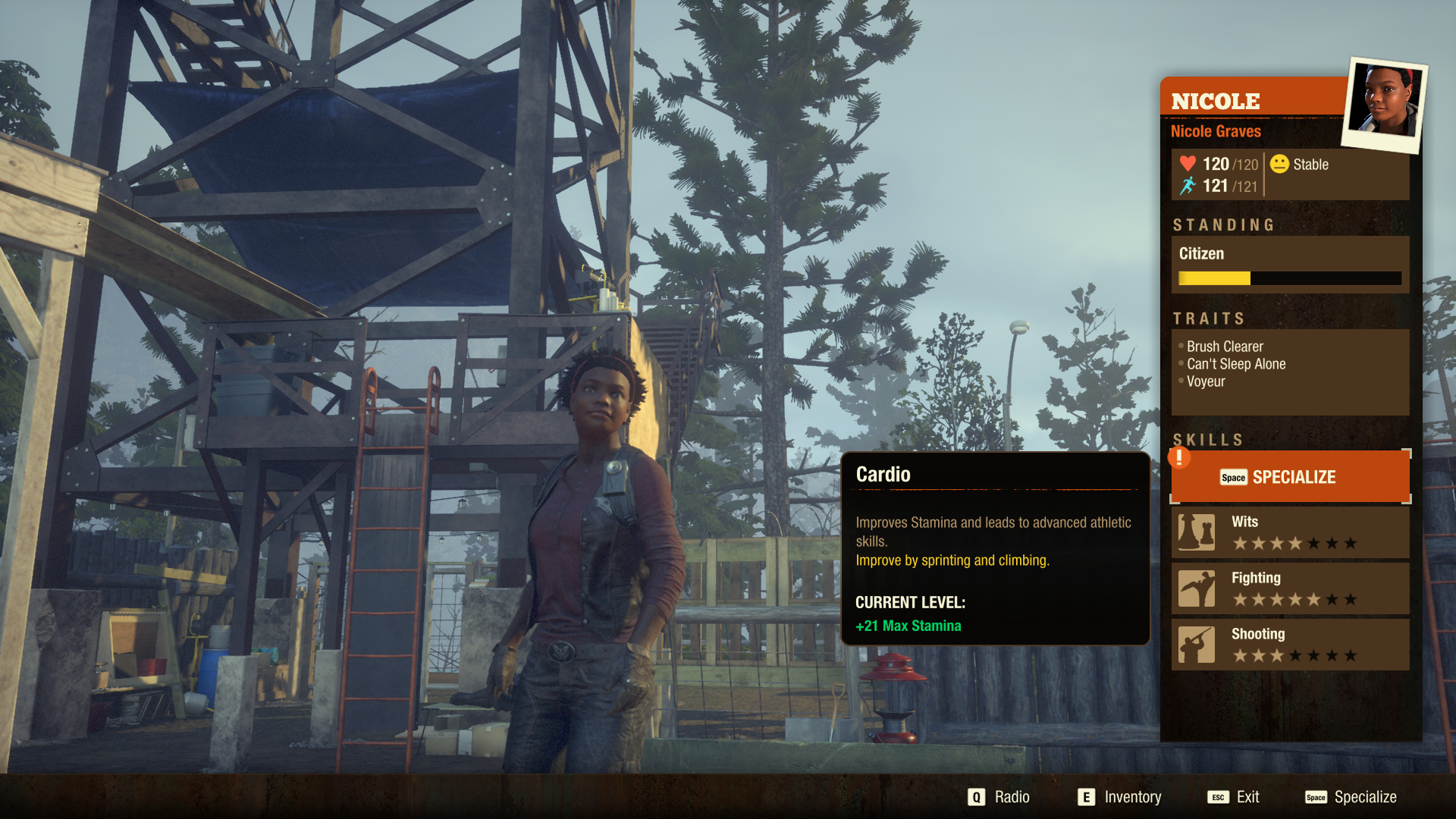
To specialize a skill, open your Character panel and select the skill that you’ve maxed out and want to specialize. A small window will pop up with that character’s specialization choices. A survivor’s particular traits can influence which specialization options are available for that character.
Standings
Every survivor in the game has a “standing” that describes their importance to your community. Most survivors in the game begin at the basic standing level of “Recruit.” As you play the game, your active survivor improves their standing by killing zombies, recovering resources for your community, completing goals, and similar actions. With enough effort, a Recruit can become a Citizen and eventually a Hero.
Each survivor who becomes a Hero unlocks a valuable perk that benefits your community. For example, a Hero’s perk might provide an ongoing resource income or improve the Health of all survivors in your community. Achieving Hero status also makes that survivor eligible to become the Leader of your community.
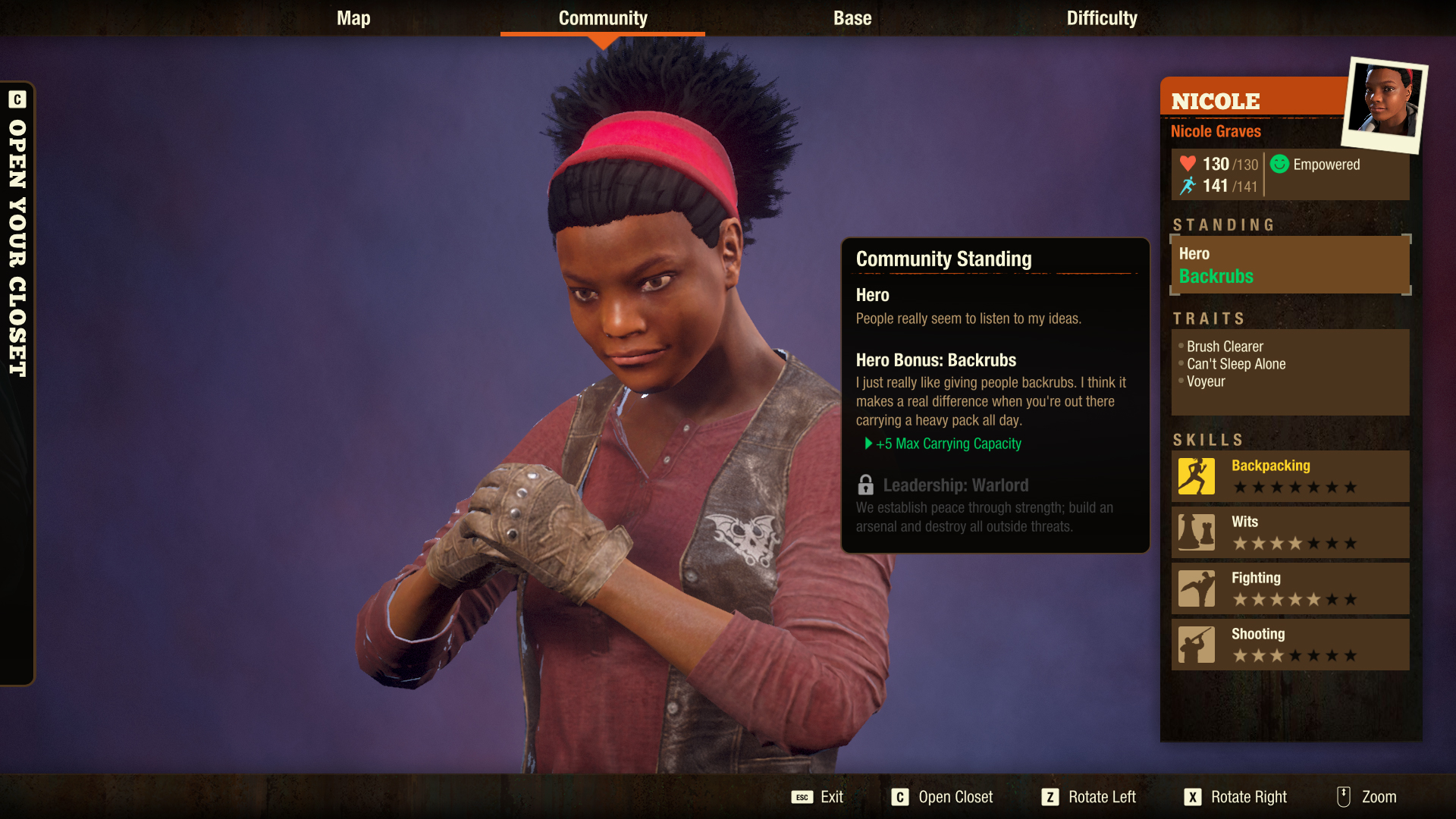
The Leader you choose affects how the rest of the game will play out. There are 4 different potential leader types: Builder, Trader, Warlord, and Sheriff. Each one has a unique approach to handling situations (after clearing out the plague hearts in the area). The Leader’s goals will depend on the type of Leader they are, and each will give you a boon upon completing the game that will give you advantages on your next playthrough. See Boons for more information.
Morale
Morale is an overall level of how comfortable the community is. A high level of morale will mean extra benefits such as increased facility action speed, build action speed and experience rate, whereas low levels of morale will incur penalties. If morale is too low, community members will become frustrated and may leave the community! Either raise the community morale or complete their personal request to keep them. Morale is closely tied to how much supplies your community has. For example, if you are low on meds, food, ammo, materials, or number of beds in your base, your morale is going to plummet. See Resource Management for more on keeping your storage full.
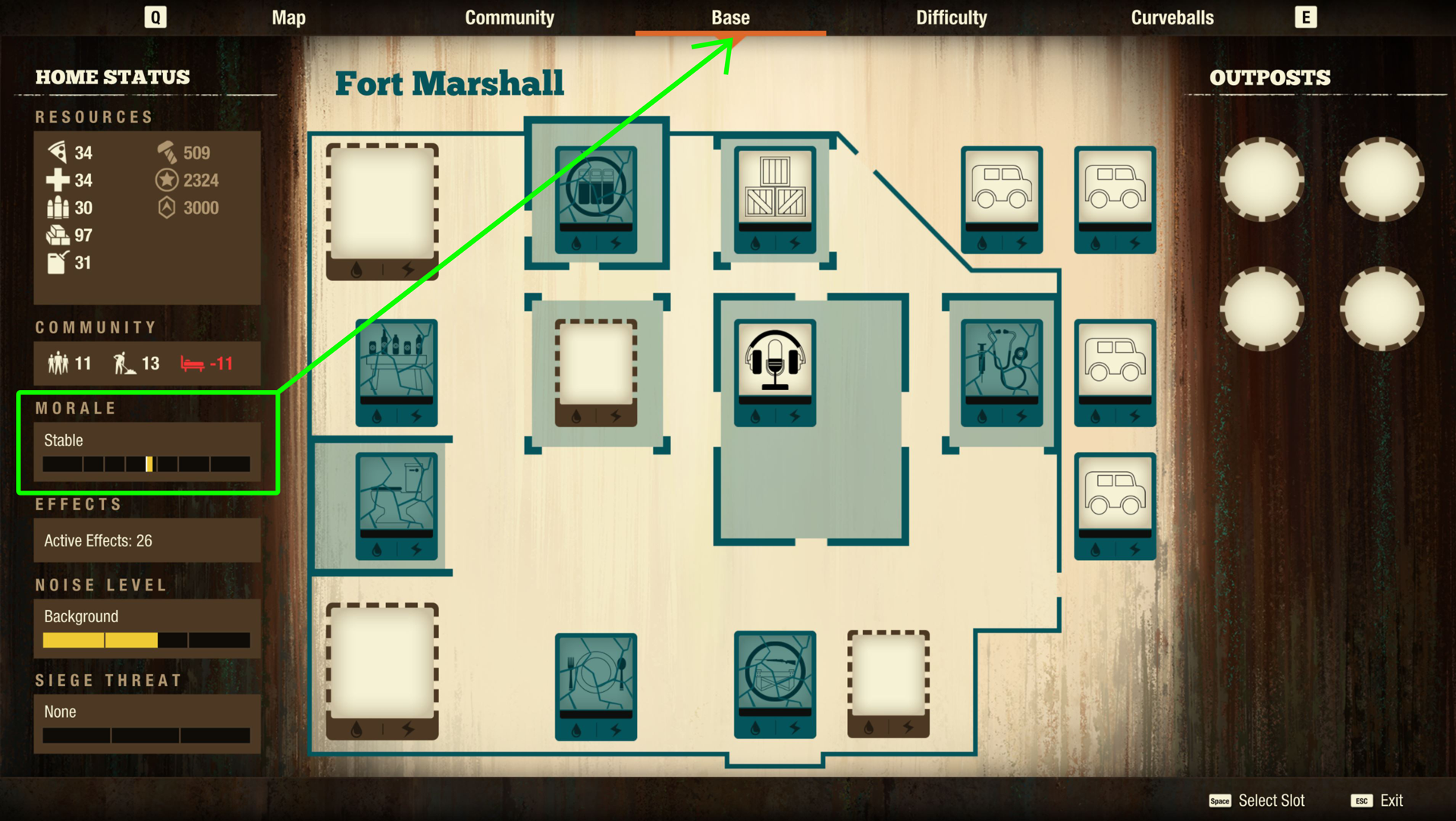
Community Size
The game limits any community to no more than 12 survivors. However, opportunities to recruit new survivors become rare once your community reaches a population of 9 or more. This makes your choices about who to recruit, who to keep around, and who to exile from your community very important!
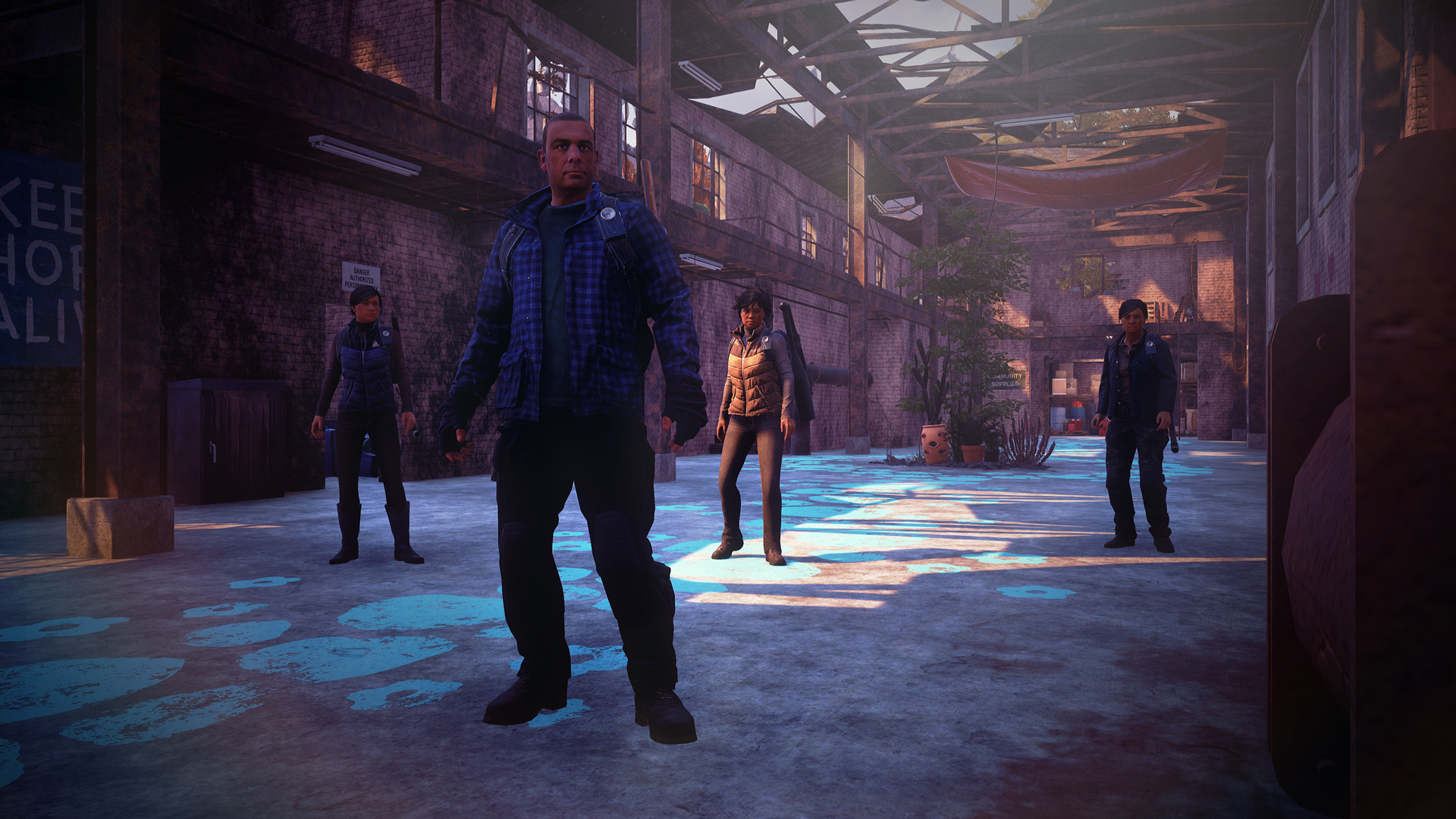
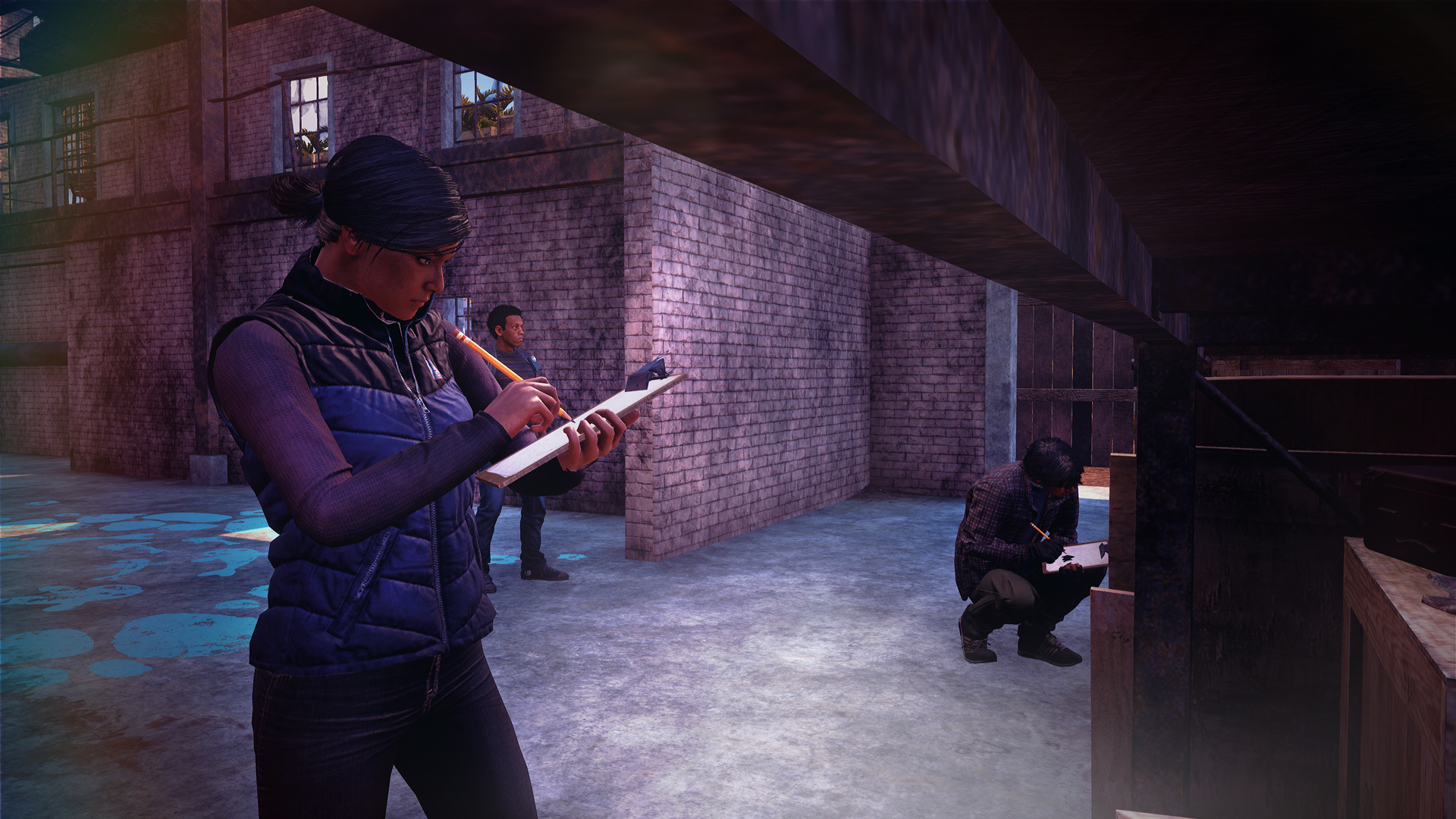
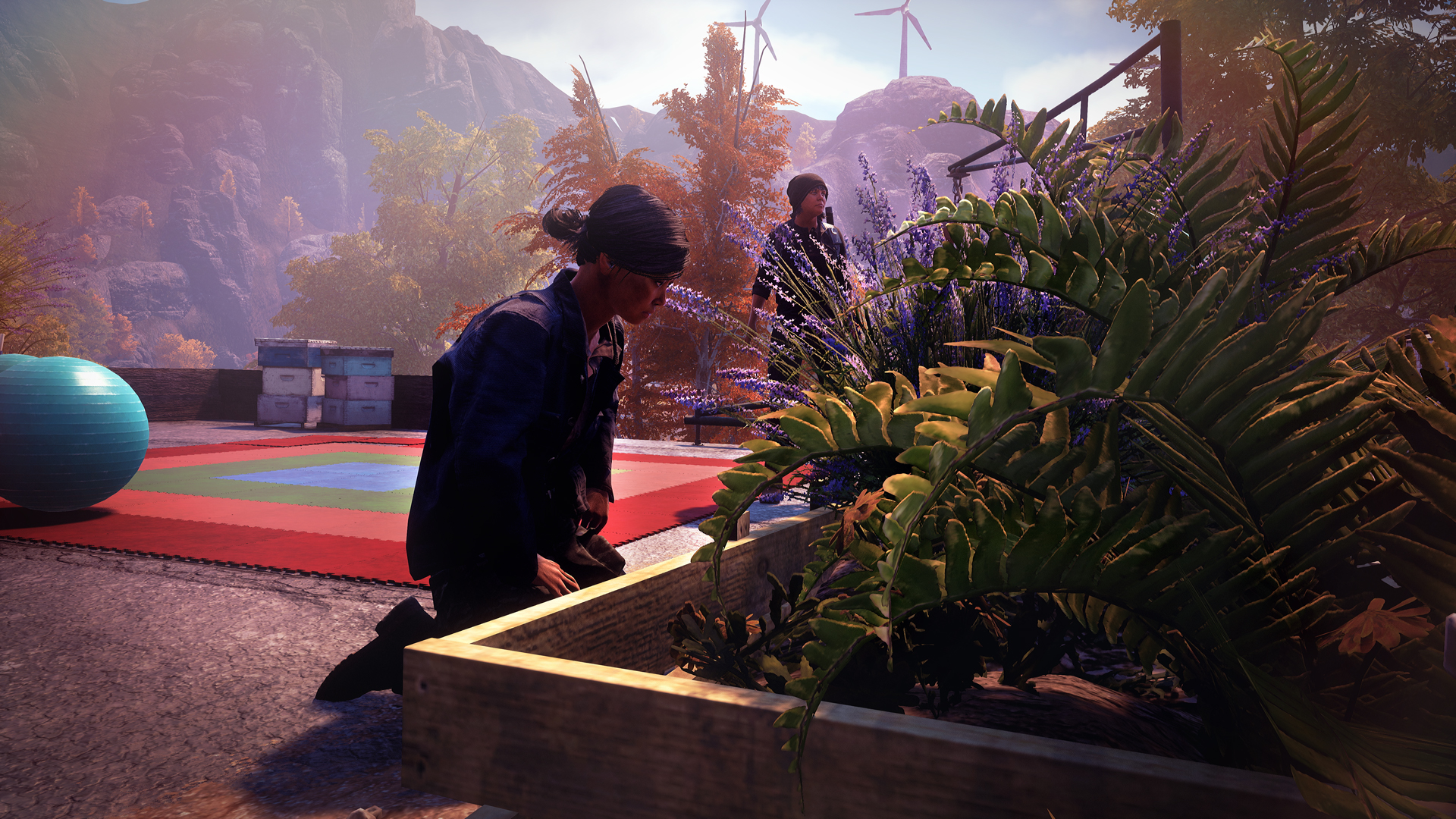
Other things to consider when growing your community:
- Will you need to move bases for more space, such as more beds?
- Do you have enough food and meds incoming to keep up with the size of your community?
- Do they have negative traits that will bring down the community’s morale? Or do the positive traits outweigh the negative?
- Where are you in the game? If you need more time to gather materials, outposts, and influence, consider keeping your community on the smaller side until you are ready to support them. If you’re ready to start taking on the bigger infestations and plague hearts, think about recruiting a few more community members to ensure you have backups in case one doesn’t come back from their mission.
Enclaves
In the game, enclaves play a crucial role in providing support and strategic advantages. These small communities create a safe zone around themselves, which can serve as a refuge when you are far from your Base and Outposts. This safe area offers you a place to retreat to, providing a tactical advantage during your explorations.
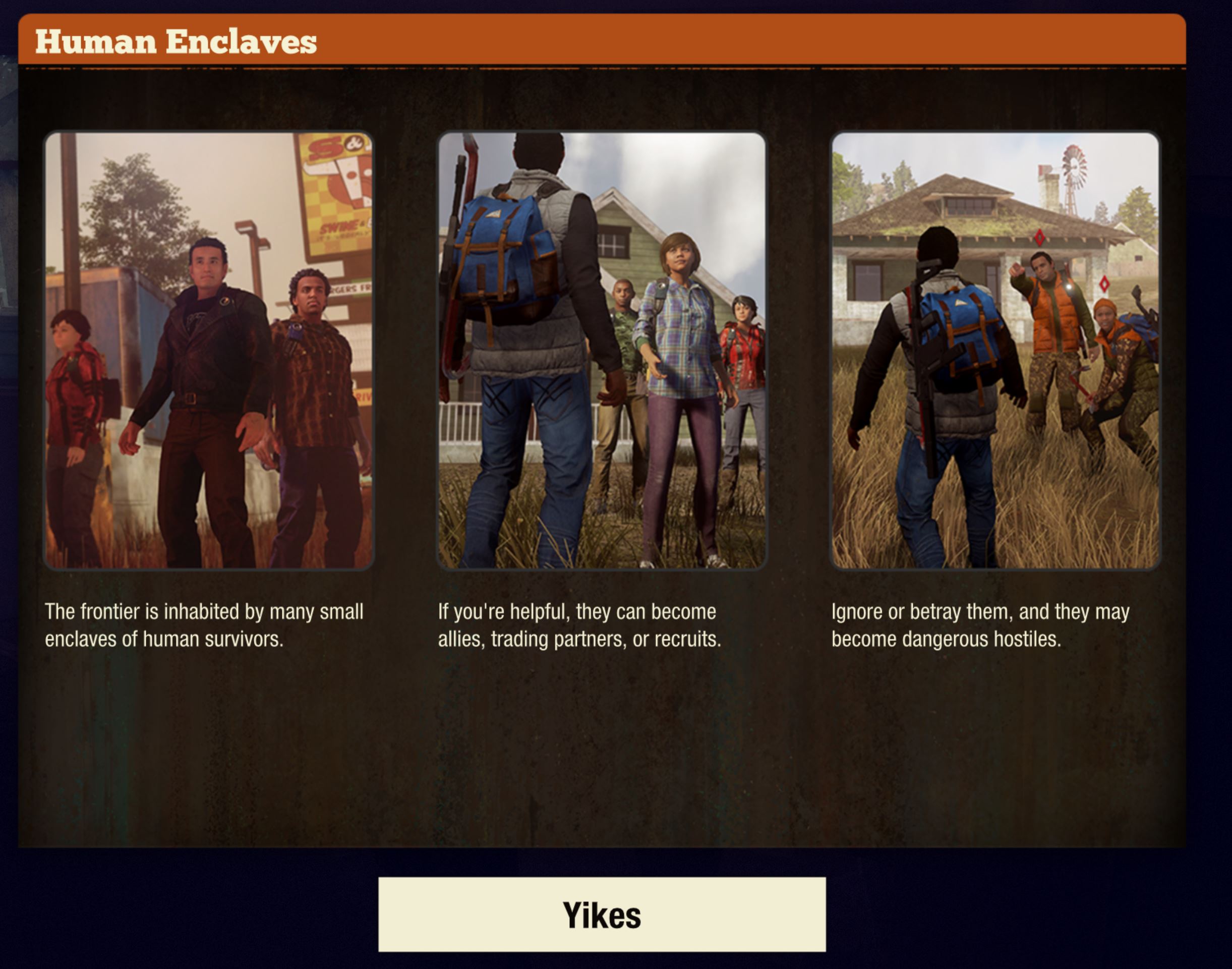
Interacting with enclaves opens up several opportunities. You can trade goods with them, enlist their members as followers, and even recruit their people into your own community. However, it’s important to note that recruiting a member from an enclave will cause that enclave to disband.
The game features several levels of relationships with enclaves, each affecting how they interact with you:

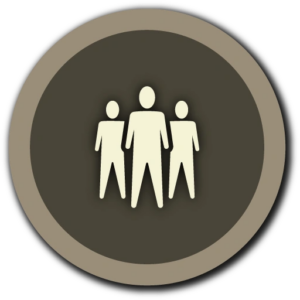
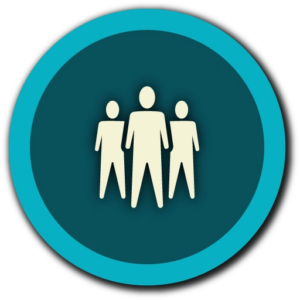
- Hostile Enclaves: These enclaves will attack you on sight. They may be inherently hostile or may become hostile if you threaten them.
- Neutral Enclaves: This is the standard status for enclaves. They do not attack on sight but also do not offer any special benefits.
- Friendly Enclaves: Enclaves become friendly if you assist them when they need help. They will buy your items at a better price, showing their appreciation for your support.
- Allied Enclaves: By continuously helping friendly enclaves, they become allied with you. Allied enclaves offer discounts on their wares, buy your items at an even better price, and provide additional Enclave Benefits (see below for more information).
One of the key benefits of having an allied enclave is access to Enclave Benefits. These benefits can vary depending on the specific enclave but typically include significant advantages that aid in survival and community management. Some examples of these benefits are:


- Supply Drops: Allied enclaves might periodically provide supply drops that include valuable resources and items.
- Unique Facilities: Some allied enclaves can grant you access to unique facilities or enhancements for your base that you wouldn’t be able to build or obtain otherwise.
- Special Skills: Members of allied enclaves can offer helpful skills and abilities that can greatly enhance your community’s effectiveness.
- Discounts and Better Trade Deals: As mentioned before, allied enclaves offer better prices for the goods you sell and discounts on items you purchase from them, making resource management more efficient.
You will continue to maintain a good relationship with your allied enclaves, as long as you are able to complete missions for them. If you fail to complete your maintenance missions, it can jeopardize your standing with your allies. The severity of the impact depends on the importance of the mission. Unsupported enclaves will eventually leave.

Thus, maintaining positive relationships with enclaves by responding to their requests for assistance is crucial for reaping the benefits they offer and avoiding the complications that come with hostile interactions.
Post-Apocalyptic Currency
Cold, hard cash doesn’t have much use after the fall of the banking system. Instead, people in State of Decay 2 rely on two currencies for bartering items and paying for favors: Influence and Prestige.
Influence
Influence is the most common currency used in State of Decay 2. You earn influence by completing goals, selling items to your neighbors, and by killing zombies. You can use your earned influence to “buy” items from your neighbors or traders, to activate various radio commands, and to claim outposts and new home bases. Each community has its own supply of influence.
When scavenging, keep an eye out for items that note their high trade value. These “luxury items” aren’t useful except to trade away for influence. Take them to your neighbors or to a wandering trader and cash them in for influence to help your community thrive.
Prestige
Prestige is the second, rarer type of currency used in the game. It’s earned by playing the Daybreak game mode, by completing sieges, or by completing Outlaws Passing Through, The Black Heart or The Gargantua Mutation’s Curveball objective. This currency allows you access to several special benefits, such as the ability to purchase weapons otherwise only available in Daybreak, or to recruit elite Red Talon operatives to your community. Your prestige is shared across all the communities attached to your account. See Radio Menu>Daybreak to learn how to get these weapons and operatives.
Your Closet
The Closet is your place to change the outfits of your community members. Give them all unique looks, or make them match like a tactical dream team, your choice! You can get there via the Community Screen. Just press Y (on a controller) or C (on the keyboard) to switch into the Closet view.
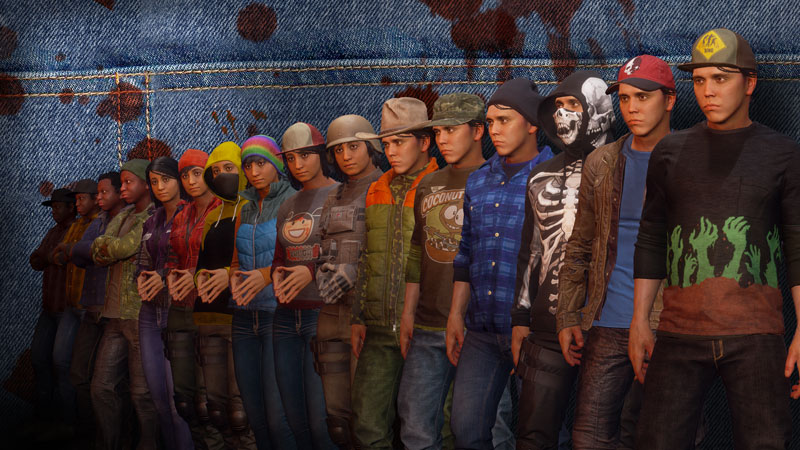
Here you can:
- Choose which outfits or hats to apply to your characters
- Highlight a locked item to find out where you can get it
- Favorite items for easy equipment later
- Rotate your character to preview the back of an outfit (since that’s what you’ll see when you play them)
You have lots of outfit options right away, but many more are waiting to be unlocked, either by looting or by completing Bounty Broker tasks.
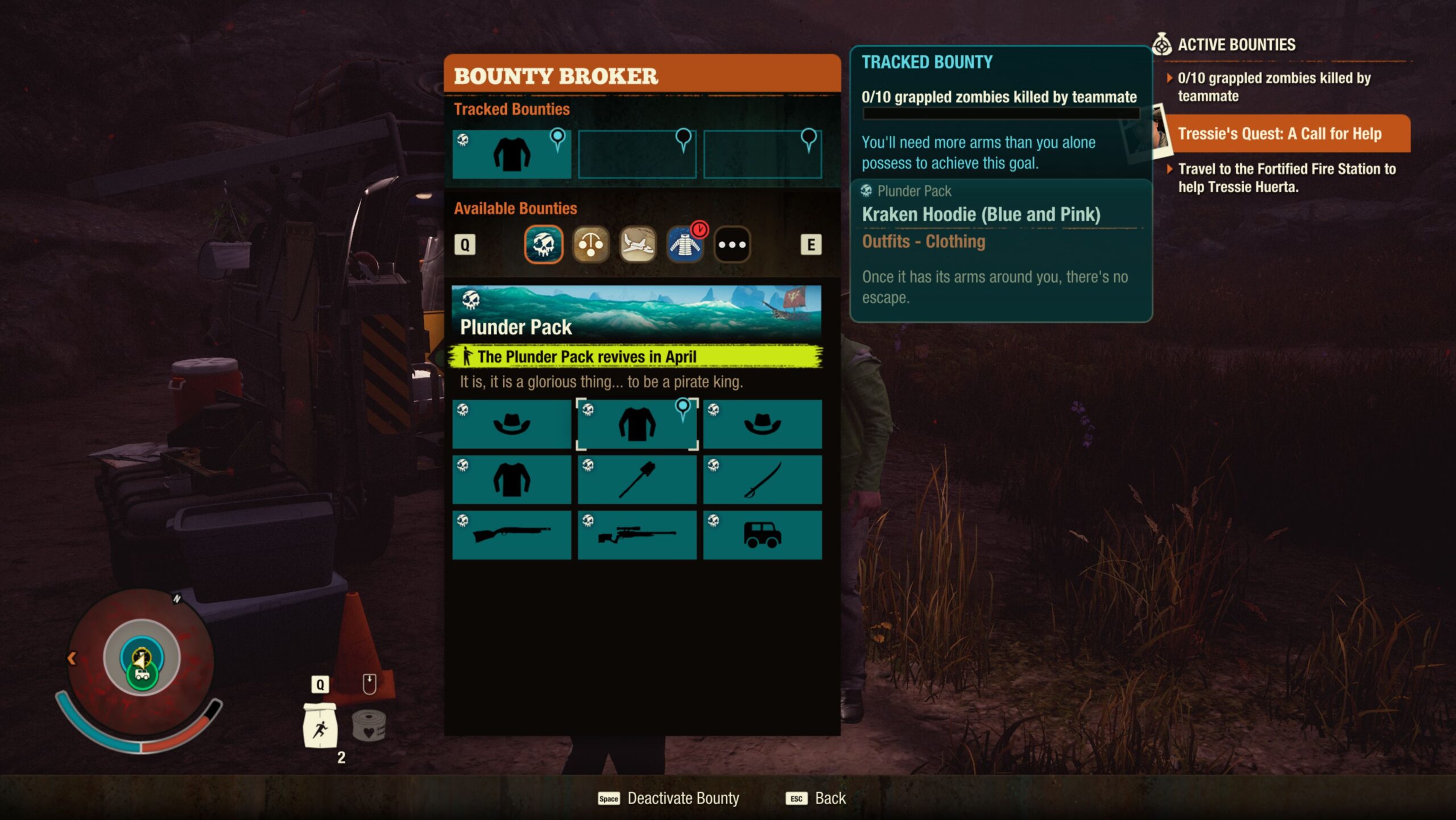
Tip: Is your backpack getting in the way of showing off your favorite outfit? You can hide your backpacks in the settings under Gameplay > Hide Character Backpacks.
